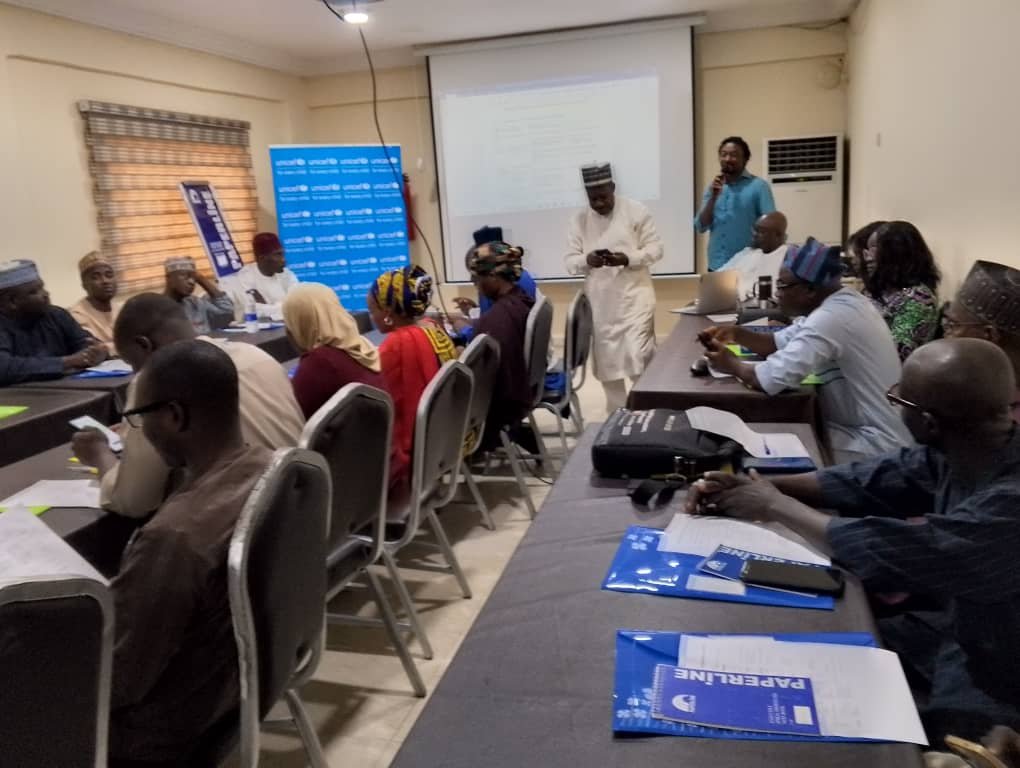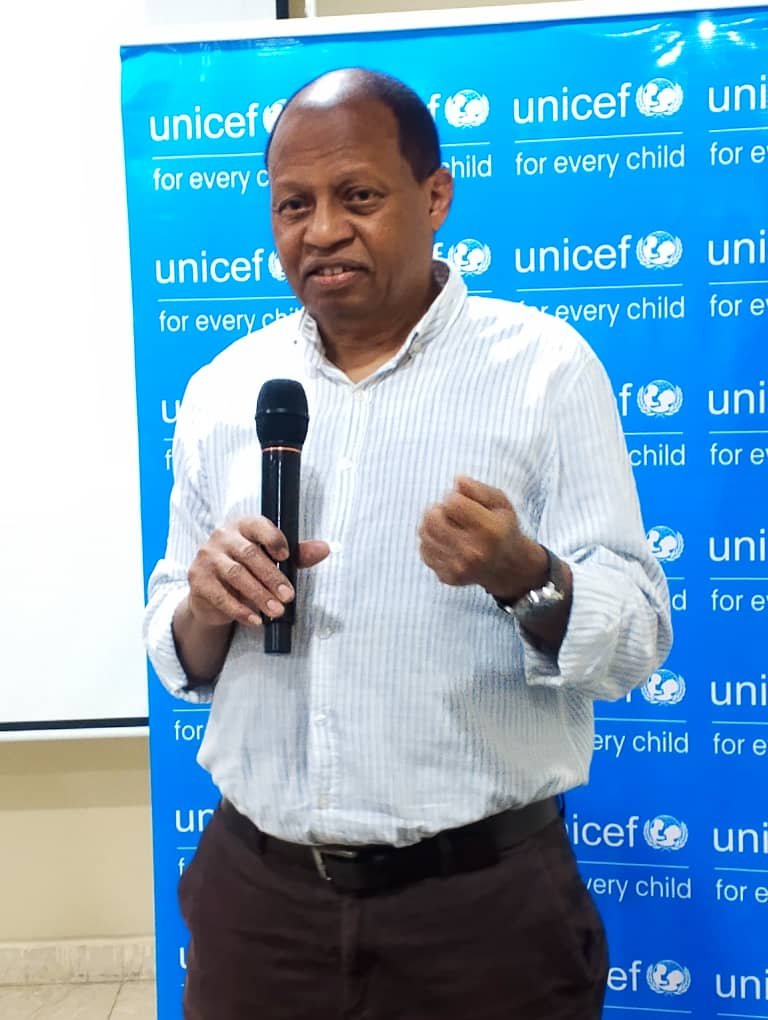Mr. Rahama Rihood Mohammed Farah, Chief of UNICEF’s Field Office Kano, in his opening remarks on the “Child Rights and the Role of Media” said Journalists would be trained on “Ethical Journalism and Child Right Reporting” to go in conformity with the world’s standard.
The two day training which took place at Tahir Quest Palace Kano brought together about 60 Journalists across the 19 Northern states to brain storm on how child’s right violation can be minimized and respected in their reportage.
According to Mr. Farah, reports involving children, such as rape or stealing, can have negative effects on their lives and futures if not handled properly by Journalists.
Mr. Farah emphasized the importance of journalists avoiding reports that may scare children or traumatize them, and instead focus on building confidence and promoting a positive future for children.
He noted that ethical reporting can heal divisions, eliminate misconceptions, and pave the way for an ideal society where children can live happily with hope for a better future.
The UNICEF official also highlighted the media’s key role in informing leadership and communities about child rights, and the need for responsible and professional reporting to avoid ambiguity or endangering children’s lives.
He also charged participants to become champions in the fight against unethical reporting and to safeguard the rights of children and everyone in the society.

He therefore, called on journalists to adhere to fundamental ethics, particularly when reporting on sensitive issues involving children, such as sexual abuse or molestation, to prevent community stigmatization and lasting social deprivation.
The Child Rights Act (CRA)
This is a law that protects the rights and welfare of children in Nigeria. It was enacted in 2003 to domesticate the Convention on the Rights of the Child and the African Charter on the Rights and Welfare of the Child. Some of the key areas are the provisions and rights guaranteed under the Act.
The Rights Guaranteed Under the Child Rights Act are the Right to Survival and Development, because every child has the right to life, survival, and holistic development, including access to healthcare, nutrition, and shelter.
Right to Education, every child is entitled to free and compulsory basic education, and protection against discrimination in education based on gender, ethnicity, or disability.
The Right to Protection from Exploitation and Abuse, the Act prohibits child labour, trafficking, and other forms of exploitation, as well as physical or psychological abuse.
The Right to Family Life, every child has the right to be raised in a supportive family environment, and protection from abandonment, neglect, and parental abuse.
The Right to Dignity and Freedom from Discrimination, every child is entitled to respect for their dignity and protection from discrimination based on their birth, place of origin, sex, or other characteristics.
Also the Key Provisions of the Child Rights Act are the prohibition of Child Marriage. The Act sets the minimum legal marriage age at 18 years and prohibits child betrothal.
The Protection from Child Labour, the Act prohibits economic exploitation, including forced labour and street begging which is the trend in northern states of Nigeria, ‘Almajeries’.
The Juvenile Justice System, the Act establishes specialized courts for children and emphasizes rehabilitation rather than punishment.
The Protection from Harmful Practices, the Act prohibits harmful traditional practices, including female genital mutilation (FGM) and tattoos or skin marks on children.
Challenges and Limitations
The Resource person, Mr Toye Falayi Director Child Rights Information Bereua (CRIB) disclosed that despite the enactment of the Child Rights Act, its implementation remains a challenge in Nigeria, whereby children are left to fend for themselves.
However some states have not domesticated the law, cultural and religious beliefs often contradict its provisions. Especially northern state of Nigeria where Islam is the dominant religion, children ‘Almajeries’ littered the streets begging for food.
Additionally, he emphasized that weak law enforcement and lack of awareness about the Act’s provisions limit its effectiveness in many communities in the country.
The Rights of the Child and the Role of the Media
In lined with the Convention on the Rights of the Child (CRC) outlines the fundamental rights of children, including the right to survival, development, protection, and participation. The media plays a significant role in promoting and protecting these rights.
Key Rights of the Child:
Toye Falayi and Dr Jide Johnson said the Right to Life, Survival, and Development of every child in Nigeria has the right to life, and access to basic needs like healthcare, nutrition, and education.
They said that the Right to Protection, children have the right to be protected from all forms of abuse, neglect, and exploitation.
They have the Right to Participation, Children have the right to express their views and be heard in matters affecting them. So Journalists while reporting should be objective enough and should not exposed some secrete abuses.
The Role of the Media:
Raising Awareness, the resource persons urged the media to raise awareness about children’s rights and issues affecting them rather than exposing them.
The media can promote positive representation of children and challenge stereotypes. Investigative Journalism, can expose child rights violations and hold perpetrators accountable.
Also Amplifying Children’s Voices, the media can provide a platform for children to express their views and concerns. Educating and Informing, the media can educate the public about children’s rights and issues, and inform policymakers about the need for child-friendly policies.
Challenges and Opportunities:
The training has also talked about “Sensationalism and Exploitation” where the media can sensationalize or exploit children’s stories, violating their rights.
And Lack of Child-Focused Reporting, the media often prioritizes other issues over child-related stories.
Opportunity for positive impact, the media can play a significant role in promoting children’s rights in Nigeria.
By promoting children’s rights and issues, the media can contribute to a more just and equitable society for all children according the resource persons.
On “Ethical Principles in Reporting Children’s Issues”
Mr Samuel Kaalu, the Communication Specialist UNICEF Field office Kano, Eric Bishen as well as Susan Akila grilled the participants on the need to operate within the law and ethics of the progression.
They said when reporting on children’s issues, journalists and media professionals must adhere to ethical principles that prioritize the best interests of the child. These principles are essential to ensure that children’s rights are respected and protected.
Key Ethical Principles here is
do no harm to the children while reporting their issues. It was stated that Journalists should avoid causing harm or distress to children through their reporting.
Best Interests of the Child, is well-being and safety, which should be the primary consideration in reporting.
Privacy and Confidentiality, is necessary. Children’s identities and personal information should be protected to prevent harm or stigma. According to the resource persons.
They said accuracy and Sensitivity, reporting should be accurate and sensitive to the child’s experience, avoiding sensationalism or exploitation.
The respect for Children’s Rights, Journalists are urged to respect the Right of the children as outlined in the Convention on the Rights of the Child.
Guidelines for Reporting on Children’s Issues,
Obtain Informed Consent, before reporting, they called on Journalists to obtain consent from parents or guardians before interviewing or featuring children in reports. Especially in term of rape cases or any of the unfortunate child abuses.
Use Age-Appropriate Language, the language to be used must be appropriate for the child’s age and understanding.
Journalists are asked to avoid graphic or distressing Content, descriptions that could harm or upset the affected children.
All reporting should focus on solutions and positive actions, rather than just highlighting problems. Collaborate with child experts, such as child psychologists or social workers, to ensure accurate and informed reporting.
Benefits of Ethical Reporting:
The protection of children’s Rights ethical reporting helps protect children’s rights and promotes their well-being.
Informed Public Discourse, is also part of “Ethical reporting” which contributes to informed public discourse and decision-making about children’s issues.
It has further been observed that “Positive Representation” Journalists can promote positive representation of children and challenge stereotypes in their reportage.
And by adhering to these ethical principles and guidelines, journalists and media professionals can ensure that their reporting on children’s issues is responsible, respectful, and promotes the best interests of the child.
In “Balancing Public Interest with Child Protection” the Resource persons Lekan Sote and Dr Eric Johnson said when reporting on children’s issues, journalists and media professionals often face the challenge of balancing public interest with child protection.
They said this balance is crucial to ensure that the rights and well-being of children are respected while also informing the public about important issues.
By striking a balance between public interest and child protection, journalists and media professionals can ensure that their reporting on children’s issues is responsible, respectful, and promotes the best interests of the child.
Mr Nansel Nimyel while brain storming in his lecture titled “Responsibilities of Print versus Electronic Media” said both print and electronic media have significant responsibilities in shaping public opinion, disseminating information, and influencing society.
He explained that while they share some common responsibilities, there are distinct differences in their roles and impacts.
By understanding their responsibilities and challenges, print and electronic media can work together to provide accurate, informative, and engaging content that serves the public interest.
Trauma Informed Journalism
In conclusion, Dr Jide Johnson said that the trauma-informed journalism is an approach to reporting that acknowledges the impact of trauma on individuals, communities, and society.
It prioritizes sensitivity, empathy, and understanding when covering traumatic events or issues which needs to be handled with care without worsening the condition of the victim.
By adopting trauma-informed journalism practices, journalists can create more responsible and compassionate reporting that prioritizes the well-being of individuals and communities.



